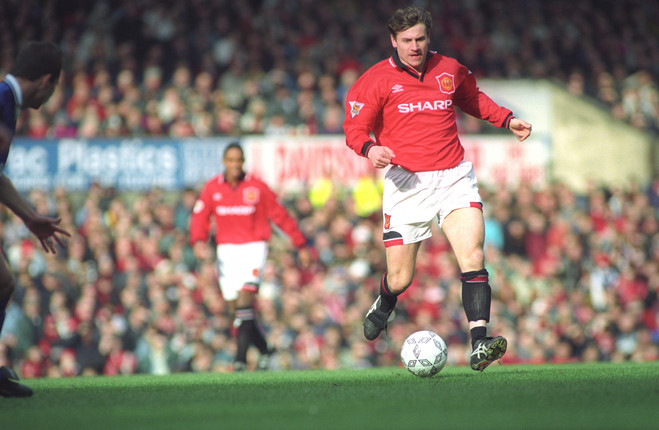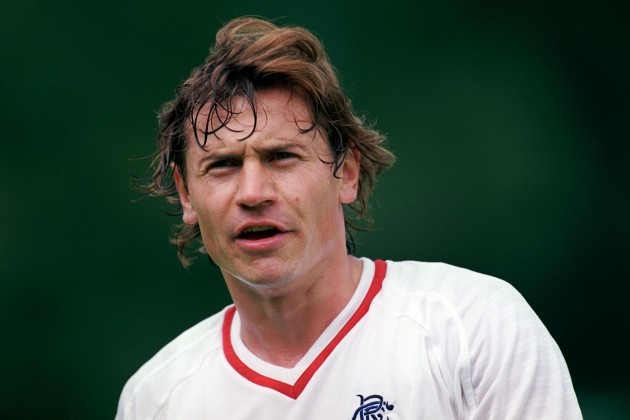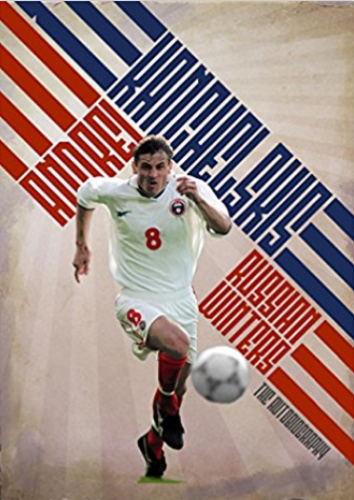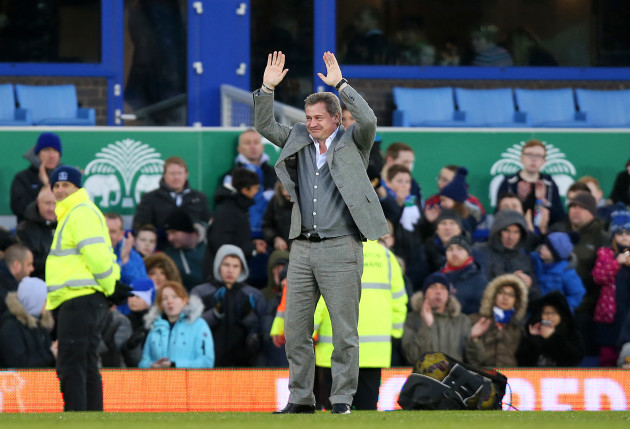THE FOLLOWING PASSAGE is an extract from Russian Winters: The Story Of Andrei Kanchelskis.
I was still at Southampton, nowhere near the first team, wondering what to do with what was left of my career when, in January 2003, I got a call from an agent called Sandor Varga.
He was from Hungar, his wife was Russian and he had worked with Oleg Luzhny and Sergei Rebrov. He had been living in Saudi Arabia for many years and he asked if I would be interested in playing for Al-Hilal.
The club’s name translates as ‘The Crescent Moon’ and it is the biggest and best-supported team in the country. It was based in Riyadh and had the backing of the Saudi royal family.
I played about a dozen games for Al-Hilal and we won the Crown Prince Cup, the Saudi equivalent of the FA Cup.
I lived in a compound for foreigners in Riyadh. The British, the French and the Americans all had their own compound and there were schools, shops and restaurants, while the apartments had a swimming pool. It was cut off from the rest of the capital; a little world for those who were not from Saudi Arabia.
The heat dominated everything. Saudi Arabia was a totally different world; a country where things happened at night. The working day began at five in the evening and ended around ten or eleven. You would go to bed at dawn and get up at about three. Training began at eight after prayers.
During the day you would either stay indoors or move from an air-conditioned apartment to an air-conditioned car that would drive you to another air-conditioned building. After a couple of months, you began to think that 36 degrees was pretty cool.
The only problem was that you couldn’t drink, which wasn’t a problem for me but it might have been for some of those I shared a dressing room with in England. I wasn’t shocked by how much English footballers drank when I was in the Premier League – the Soviet Union was notorious for how much alcohol people put away.
What surprised me was that they didn’t eat while they drank. In the beer bars of the Soviet Union there would always be a plate of salt fish to hand, and as people got wealthier there might be prawns or crayfish. In England there was only one thing on the menu – straight beer.
Few, however, touched cigarettes, while in Italy lighting up was more tolerated than if you opened a can of beer or went off for fast food. Fiorentina always encouraged you to have a glass of wine with your meal. When I broke into the Soviet Union’s national team in 1991, I discovered I was the only non-smoker.
Walking into the dressing room was like entering a pub. When we were in hotels waiting to go to the game, I used to have to ask them to go out on to the balcony if they wanted a cigarette.
You could get alcohol in Saudi Arabia, if you knew the right kind of local; if you wanted a beer, one could be arranged. The biggest drinkers of all were some members of the Saudi royal family.
Because it was forbidden for the police to enter the home of a member of the royal family, some had huge stocks of alcohol in their palaces. They would take trips to Bahrain or London to party. In all my years in football I had never seen anyone drink so much as some of those Saudi princes.
Al-Hilal employed a couple of foreigners, including the Cameroon forward, Patrick Suffo, who had played for Sheffield United, and the managers were foreign. I was only at Al-Hilal for a short while but I still had two managers. The first was Ilie Balaci, a great Romanian footballer, who had spent years managing in the Arab world.
He was replaced by Aad de Mos, who had won the Dutch Eredivisie with Ajax and won the Cup Winners’ Cup in 1988 with Mechelen by beating Ajax in the final. After all my problems with Dick Advocaat, I thought it funny that I had come all this way to be managed by another Dutchman, but I found De Mos to be one of the good guys.
The coaching was done in English. Al-Hilal’s greatest player was their centre-forward, Sami Al-Jaber, who scored more than 100 goals for the club. He was still leading their attack and had spent several months on loan at Wolves, so he was able to translate for me if anything was said in Arabic.
When you went outside the compound, you were struck by just how different it was. For a capital city, Riyadh was very quiet, except for the call to prayer that rang out five times a day.
Everyone wore Islamic dress, which made you stand out even more as a foreigner. When my wife, Inna, came over to visit she would wear a headscarf. What Saudi women wore depended on what their husbands wanted.
Their dress reflected the requests of their men. Sometimes it would be a hijab, sometimes a full burka. In Saudi Arabia, the schools would close when the temperatures reached 40 degrees. For reasons I was never able to work out, the official temperatures in Riyadh never went above 39.8.
For someone living in one of the wealthiest countries in the world, I came across a lot of very poor people. Some houses did not even have electricity. If you went inside, you would see homes lit by oil lamps.
The president of Al-Hilal was a member of the Saudi royal family, Prince Abdullah. He had been educated in the United States, was a big fan of American football and he spoke perfect English.
The Saudi royal family would never invite you into their homes — only relatives were allowed in — but I would be invited to a camp in the desert or a guest house, where you would be given everything you could possibly need.
I would go out there and play chess or darts or cards with Prince Abdullah until four in the morning.
I’d long been interested in chess. I have a plan to open the kind of sports boarding school that I went to in Kharkov and, if that ever comes to fruition, I would have chess on the curriculum. Chess teaches you a lot about tactics and lateral thinking.
Chess was very popular in the Soviet Union, not least because Lenin had been a fan of the game. The day before a match, the whole team would go to the training ground, where they would rest, eat and sleep before the match, and each training ground would have its own chess tables.
There would also be billiard tables and places where you’d play cards or backgammon, but they were very keen on the footballers to play chess because it encouraged them to think. There were no PlayStations, no mobile phones and no internet to help pass the time.
When I was at Manchester United a pack of cards was the key to killing time. Steve Bruce, Bryan Robson and I often played cards on the bus and sometimes Alex Ferguson would come up to the back for a few hands of brag.
In Russia we would play Durak, where the aim is to get rid of all your cards. You didn’t bet on it but the last player with cards in his hand would be the durak or ‘fool’.
The highlight of my time in Saudi Arabia was the final of the Crown Prince Cup, a Riyadh derby between Al-Hilal and Al-Ahli, which we won 1–0 in front of about 40,000.
Normally, the crowds would be about 10,000, with no women allowed into the stadium. They weren’t even allowed to drive a car. If you went into a department store, there would be a single floor for women only; the rest of the store would be for men.
There were rules that were equally bizarre. They would allow you to take photographs with a normal camera but not with a mobile phone equipped with a camera. If you bought a mobile phone in Saudi Arabia, it would already have had its camera removed.
The attitude to life was different. Death was regarded as routine, something almost unworthy of comment. You would hear stories, told matter-of-factly, about people who had been on the Hajj to Mecca and who had stumbled, fallen and been crushed to death as a sea of people walked around the big, black cube of the Kaaba.
It might seem callous to non-Islamic eyes, but to die on the Hajj confers in Saudi Arabia a kind of privilege. If you die within the walls of Mecca, you go straight to heaven.
I don’t know where those who were executed in Deera Square went. I was once asked if I wanted to go to a public execution of eighteen Filipinos who had been convicted of drug trafficking. Naturally, I said no.
Deera Square – or ‘Chop-Chop Square’ as the locals called it – was where Riyadh staged its beheadings. They were held on a Friday after morning prayers. It is all designed to make the penalties of the Saudi justice system very clear.
If it were an ‘execution Friday’, a substantial crowd would be guaranteed. It would be less than would come to watch the football in the King Fahd Stadium but the square would still be pretty packed. It was regarded as both a spectacle and as an education
It was a strange land but one I could negotiate my way through and one in which I might have stayed longer but for the intervention of Al-Qaeda.
On the night 12 May 2003 there were coordinated attacks against Western compounds across Riyadh. They hit the Dorrat Al-Jawadel, which was owned by one of Saudi Arabia’s wealthiest businessmen, the hotelier, Mohamed Al-Jaber.
Then a truck and a BMW pulled up outside the Oasis Village at Al-Hawra. The explosives inside the truck were set off and the buildings were sprayed with bullets from AK47s fired by the men in the car, who were dressed as security guards.
Then they attacked the Vinnell complex, which housed Americans who trained the Saudi Royal Guard. By the end of the night there were 39 dead and 160 injured.
I was playing chess with Prince Abdullah in his camp when the attacks began and I knew nothing of the bloodshed until the next morning when Inna called from Moscow. When I asked why there was this panic in her voice, she said, ‘Haven’t you been watching the news?’
One of the compounds Al-Qaeda had attacked was near to where I was living. Any foreigner who lived in Saudi Arabia was now a legitimate target. I packed my bags and flew back to Moscow the next morning.
Russian Winters: The Story Of Andrei Kanchelskis is published by De Coubertin Books. More info here.
The42 has just published its first book, Behind The Lines, a collection of some of the year’s best sports stories. Pick up your copy in Eason’s, or order it here today (€10):



